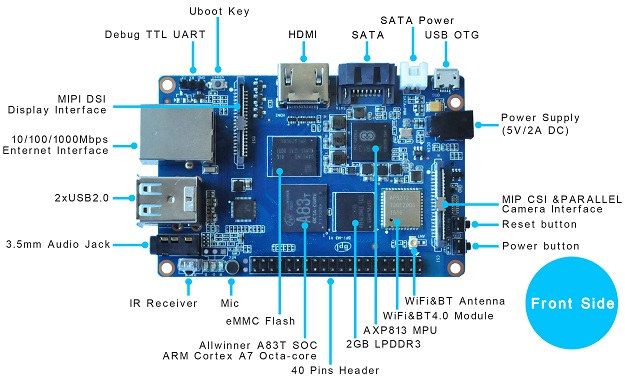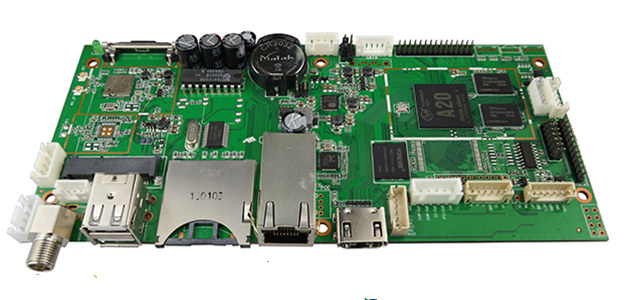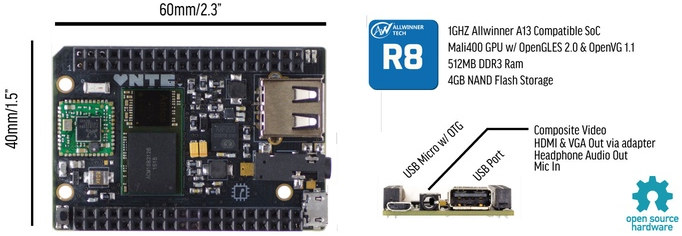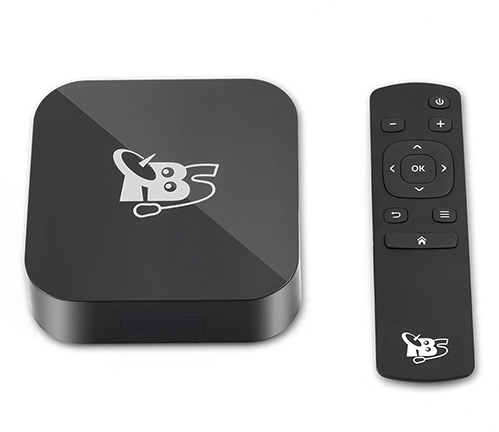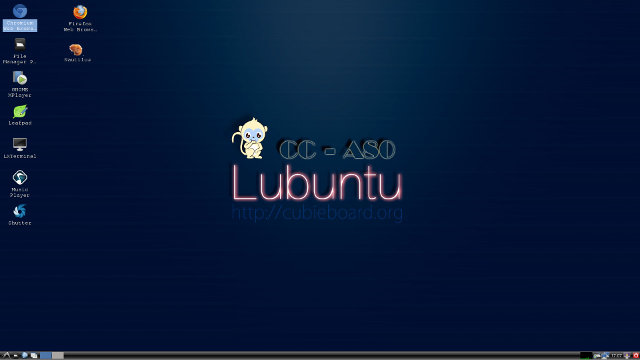Linus Torvalds released Linux Kernel 4.2 last Sunday: So judging by how little happened this week, it wouldn’t have been a mistake to release 4.2 last week after all, but hey, there’s certainly a few fixes here, and it’s not like delaying 4.2 for a week should have caused any problems either. So here it is, and the merge window for 4.3 is now open. I already have a few pending early pull requests, but as usual I’ll start processing them tomorrow and give the release some time to actually sit. The shortlog from rc8 is tiny, and appended. The patch is pretty tiny too. Go get it, Linus Some notable changes made to Linux 4.2 include: File systems New features for F2FS including per file encryption CIFS support SMB 3.1.1 (experimental) Cryptography – Jitter Entropy Random Number Generator, Chacha20 stream cipher and Poly1305 authentication (RFC7539),New RSA implementation. See lwn.net […]
Banana Pi BPI-M3 Development Board Features Allwinner A83T Octa core Processor
Banana Pi developers, in this case SinoVoIP, and not LeMaker, are about to launch a new board: BPI-M3 powered by Allwinner A83T octa core Cortex A7 processor with 2GB RAM and 8GB eMMC. Banana Pi M3 board specifications: SoC – Allwinner A83T octa-core ARM Cortex-A7 @ 2.0 GHz with PowerVR SGX544MP GPU supporting OpenGL ES 2.0/1.1, OpenCL 1.1, DX 9.3. System Memory – 2 GB LPDDR3 Storage – 8 GB eMMC + SATA (via Genesys GL830 USB bridge, shared with 2 USB ports) + micro SD slot Display Interfaces / Video Output – HDMI 1.4 up to 1920×1200, MIPI DSI connector Audio – 3.5mm headphone jack, microphone, HDMI audio Camera I/F – MIPI CSI and Parallel camera interfaces Connectivity – Gigabit Ethernet (Realtek RTL8211E/D), 802.11 b/g/n Wi-Fi and Bluetooth 4.0 (AP 6212 module) USB – 2x USB 2.0 host port, 1x micro USB OTG Debugging – UART for console Headers […]
Faytech FTA20 Allwinner A20 Industrial SBC Works with Touch Panels
Faytech is a company specializing in touch monitors and touch pc, but recently they started to develop embedded boards, and their latest FTA20 single board computer is powered by Allwinner A20 SoC, and offer various optional wireless options like Bluetooth, WiFi, 3G, and GPS. The board also supports the company’s 9.7”, 10.1”, 15” and 21.5” capacitive displays. FTA20 Specifications (to be confirmed): SoC – Allwinner A20 dua lcore Cortex A7 processor @ 1GHz with Mali-400MP2 GPU @ 500MHz System Memory – 1GB DDR3 Storage – 8GB NAND Flash, 1x SD card slot, 1x SATA port (via headers) Video Output – 1x HDMI, 1x VGA, 18/24Bit LVDS Audio – Audio-Chip Integrated HI-FI 100dB Audio Codec, 2x3W amplifier; 5.1 Channel High Definition Audio Codec; 1x Line-In, 1x Line-Out Connectivity 1x 10/100/1000Mbit RJ45 Ports with connector for POE WiFi Optional Bluetooth 4.0 and GPS 1x SIM-card (to be used with mPCIe modem???) USB […]
CHIP is a $9 Linux Development Board Powered by Allwinner R8 (Crowdfunding)
It’s quite common to find MCU board for less than $10, but if you want to run Linux, you’ll need to spend a bit more, unlessit’s sponsored, and today, the cheapest you can get is probably the $20 Raspberry Pi Model A+, unless you go with some OpenWRT compatible routers. But there’s now a new board in development, called CHIP, with Allwinner R8 Cortex A8 processor, 512MB RAM, and 4GB NAND flash, as well as wireless connectivity, that will bring cost even lower, as you can pledge $9 on Kickstarter to fund its development. C.H.I.P specifications: SoC – Allwinner R8 Cortex A8 processor @ 1 GHz with Mali-400 GPU (Compatible with Allwinner A13) System Memory – 512 MB RAM Storage – 4GB NAND flash Connectivity – 802.11 b/g/n Wi-Fi + Bluetooth 4.0 Video Output – 3.5mm jack for composite video and audio (HDMI and VGA available via adapters) USB – […]
Linaro 15.04 Release with Linux 4.0 and Android 5.1
Linaro 15.04 has been released with Linux 4.0 (baseline), Linux 3.10.74 and 3.14.39 (LSK), and Android 5.1.1. Other noticeable changes include support for the new DragonBoard 410c 96boards compliant board, the addition of A80 Optimusboard (Allwinner A80) to Android Kitkat build, Hisilicon D01 support added to the Debian installer, and support for Ubuntu ARM64 Gnome rootfs. Highlights of the release: Linux Linaro 4.0-2015.04 updated linaro-android topic: aosp/android-3.18 branch has been merged GATOR topic: version 5.20.1 updated integration-linaro-vexpress64 topic by ARM LT (FVP Base and Foundation models, and Juno support) updated topic from Qualcomm LT (IFC6410 and DB410c boards support): Resource Power Manager (RPM) – MSM Shared Memory Driver (SMD) driver quite some changes under drivers/gpu/drm/ related to adv7511 and adv7533 support ASoC support for QCOM platforms external Connector Class (extcon) support (used for USB VBUS and ID detection) Linaro builds of AOSP 15.04 baseline updated to android-5.1.1_r1 updated Nexus 10 […]
TBS 2980 Matrix 2 AllWinner A80 Android TV Box Will Support USB Tuners
TBS launched their Matrix 2910 media player based on Freescale i.MX6 Quad processor in 2013, and what made the platform especially interesting was support for the company’s USB DVB tuners in their Android and Ubuntu images. The company has now unveiled its successor with TBS 2980 Matrix 2 powered by Allwinner A80 octa core processor that will also support USB DVB-T2, DVB-C & DVB-S2 tuners. TBS Matrix 2 specifications: SoC – AllWinner A80 4x Cortex 15, 4x Cortex A7 big.LITTLE processor with PowerVR GC6230 GPU System Memory – 2GB DDR3 Storage – 8GB eMMC + micro SD card slot Video Output – HDMI + AV port Audio – HDMI, AV, and optical S/PDIF Connectivity – Gigabit Ethernet, dual band Wi-Fi 802.11 a/b/g/n, Bluetooth 4.0 USB – 1x USB 3.0 port, 2x USB 2.0 host ports Misc – IR receiver, reset button Power Supply – 5V/3A Dimensions – 101 x 101 […]
Linux 4.0 Release – Main Changes, ARM and MIPS Architectures
Linus Torvalds “Ima Sheep” released Linux Kernel 4.0 on Sunday: So I decided to release 4.0 as per the normal schedule, because there really weren’t any known issues, and while I’ll be traveling during the end of the upcoming week due to a college visit, I’m hoping that won’t affect the merge window very much. We’ll see. Linux 4.0 was a pretty small release both in linux-next and in final size, although obviously “small” is all relative. It’s still over 10k non-merge commits. But we’ve definitely had bigger releases (and judging by linux-next v4.1 is going to be one of the bigger ones). Which is all good. It definitely matches the “v4.0 is supposed to be a_stable_ release”, and very much not about new experimental features etc. I’m personally so much happier with time-based releases than the bad old days when we had feature-based releases. That said, there’s a few […]
Cubieboard 4 Ubuntu Review – Setup, Usability, and Performance
Cubieboard4 is a development board powered by Allwinner A80 octa-core processor with 2GB RAM and 16GB eMMC. I’ve already shown how to get started with the board using the pre-installed Android 4.4 image, and run some benchmarks in Android, so now it’s time to check out the Ubuntu Linaro 14.04 image provided by CubieTech. I’ll show how to install and setup Ubuntu 14.04 on the board using a micro SD card, run desktop applications like Chromium, Libre Office, and son on on the board, and complete the review with some Linux benchmarks. Setting up Ubuntu on Cubieboard4 Firmware images for Cubiebord4 can be downloaded @ http://dl.cubieboard.org/model/cc-a80/Image/. Currently Android 4.4, Debian server, Ubuntu Linaro server, and Ubuntu Linaro desktop with LXDE desktop environment. That’s the latter I’ll use for the experiment, and two images are available: linaro-desktop-cb4-card-hdmi-v0.4.img.7z – Bootable image from micro SD card linaro-desktop-cb4-emmc-hdmi-v0.4.img.7z – Installation image to eMMC to […]



